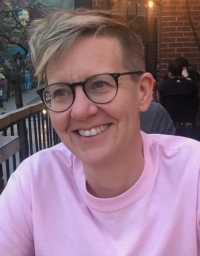Dr. Wendy Peters

Dr. Peters teaches the following courses: Gender and the Media; Queer Media; Race and Gender in Popular Culture; Reality TV and the Politics of Difference; Sex, Body and Identity, and Women, Media and Representation. Wendy won the Chancellor’s Award for Excellence in Teaching in 2023.
Areas of Specialization:
critical media studies; critical race theory; cultural studies; feminist theory; postmodernism; queer theory
McDonald, Robin Alex & Peters, Wendy (forthcoming December 2025). Screening the Subject: A Review of Multimedia and Video Artworks in the Exhibition Scientia Sexualis. Screen Bodies, 10(2). Both authors contributed equally to this work.
McDonald, Robin Alex & Peters, Wendy (2025). “If the art ends up being pretty, making it here won’t be”: Examining Precarity, Neoliberalism, and Artists’ Labour on CBC’s Crash Gallery. Canadian Journal of Communication, 50(2), 249–277. doi:10.3138/cjc-2024-0056. Both authors contributed equally to this work.
Peters, W. (2022) “I’m the Industry Baby:” The Political Economy of Lil Nas X. Flow: A Critical Forum on Media and Culture, 29(2). URL: https://www.flowjournal.org/2022/10/overflow-im-the-industry-baby/
Peters, W. (2022). Post-feminist, post-race and post-closet discourses in Critical Studies in Media Communication from 2000-2020. Review of Education, Pedagogy, and Cultural Studies, 44 (5): 469-492. doi: 10.1080/10714413.2021.2007207
Peters, W. (2018). Patient Stories: Re-narrating Illness and the Value of the Rejected Body (307-322). In Batacharya, S. & Wong, R. (Eds.) Sharing Breath: Embodied Learning and Decolonization. Athabasca University Press: Edmonton, AB. http://www.aupress.ca/index.php/books/120269
Peters, W. (2018). The Privilege of Knowing Better: Female Millennial Demographics and the Representation of Homophobia on Teen TV. Queer Studies in Media & Popular Culture, 3(2): 191-211.https://doi.org/ 10.1386/qsmpc.3.2.191_1
Peters, W. (2018). Review of Queer Girls, Temporality and Screen Media: "Not Just a Phase." Feminist Media Studies, 18(2): 331-332.https://doi.org/10.1080/14680777.2018.1436906
Peters, W. (2016). Contours of the Closet: Conceptualizing Straight / Gay on Teen TV. FlowTV: A Critical Forum on Television and Media Culture, 22(5). URL:http://www.flowjournal.org/2016/03/contours-of-the-closet/
Peters, W. (2016). Bullies and Blackmail: Finding Homophobia in the Closet on Teen TV. Sexuality & Culture (iFirst, February 5 2016). For those with university access this article is currently available online ahead of the print version athttp://dx.doi.org/10.1007/s12119-016-9336-3
Peters, W. (2016) Victim + bully = love.FlowTV: A Critical Forum on Television and Media Culture, 22 (3). URL:http://www.flowjournal.org/2016/01/victim-bully-love/
Peters, W. (2015). Teen TV’s post-closet and postracial fictions.FlowTV: A Critical Forum on Television and Media Culture, 22 (1). URL:http://flowtv.org/2015/10/teen-tvs-post-closet-and-postracial-fictions/
Peters, W. (2011). Pink dollars, White collars: Queer As Folk, valuable viewers, and the price of gay TV. Critical Studies in Media Communication, 28 (3): 193-212. (6% acceptance rate).For those with university access this article is online athttp://dx.doi.org/10.1080/15295036.2011.559478
Peters, W. (2009). “It feels more like a parody”: Canadian Queer As Folk viewers and the show they love to complain about. Journal of Lesbian Studies, 13 (1): 15-24. For those with university access this article is online at http://dx.doi.org/10.1080/07380560802314094
Above article was invited for reprint in S. E. Cooper (Ed.) (2010) Lesbian Images in International Popular Culture. Routledge: New York, NY.
Peters, W. (2005). Queer identities: Rupturing identity categories and negotiating meanings of queer. Canadian Woman Studies / les cahiers de la femme, 24 (2/3): 102-107.
Peters, W. (2003). Pretty, witty and White: Disrupting hetero-normalcy and reinventing privilege on Queer As Folk. Canadian Journal of Community Mental Health, 22 (2): 135-137.
Peters, W. (1999). T.V.’s not evil, I am. broken pencil, 11 (Fall), 28.Independent Publications / Zines
The following listings are independent publications made for small-scale distribution.
Women’s Studies Studies Union (Eds.) (2005). The Cut’n’Paste Yearbook. ASSU: Toronto, ON. Conceptualized, co-ordinated and created this independent publication on behalf of and together with members of the Women’s Studies Student Union.
Peters, W., Bourgeois, M., Odette, F. & L. Dolmage (Eds.). (2001). Dis’n’tangle. 72 pages. Rainbow Alliance: Toronto, ON. An independent publication concerning queerness and disability. This zine is presently required reading on the syllabi for two University of Toronto courses: Theorizing Deviant Bodies and Gender and Disability.
Peters, W. (2000). Foucault: Let’s Talk About Sex, Baby. Beating Around the Bush, 1, (Fall). Publication funded by Pussy Willow Womyn’s Health Collective and OPIRG: Toronto, ON.
Peters, W. & Pearce, L. (Eds.). (1999) doubleshift: Ladies Home Journal of Feminist Activism. 52 pages. Becky Lives: Winnipeg, MB. This zine received an excellent review in broken pencil magazine (Fall 1999, issue 11, pg. 35).
Peters, W. (1998) I-Rate. 10 pages. A zine concerned with the struggles of applying to graduate schools.
